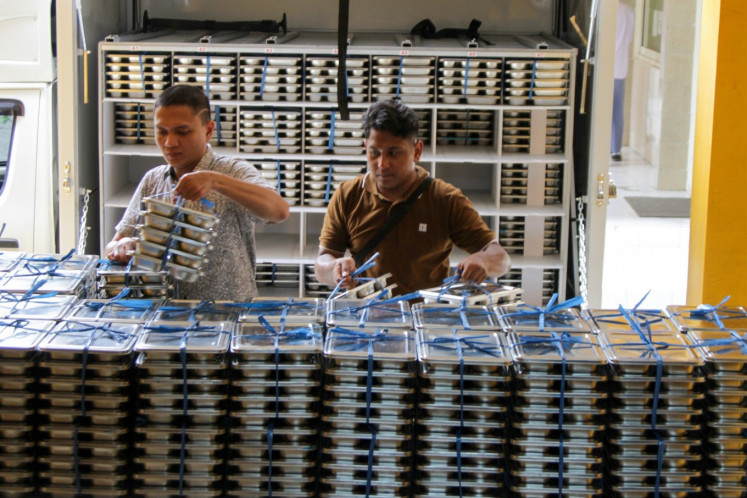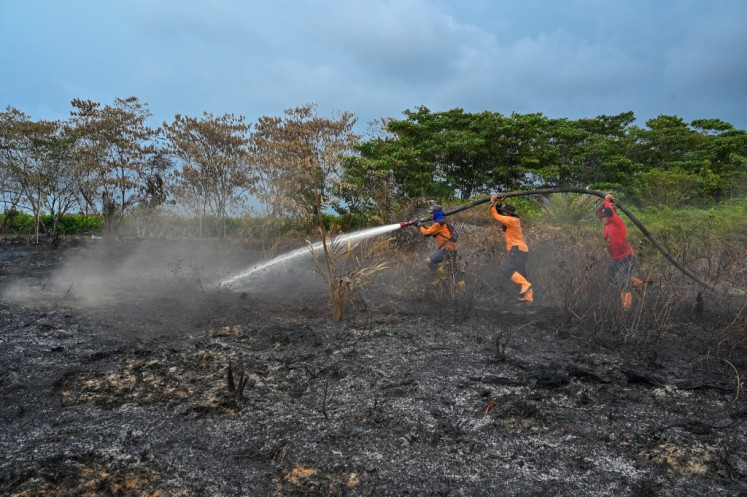Implementing CSR in difficult times
courtesy of Danone AquaDuring the current controversial case of Bank Century, most people are contemplating the conflict and politics
Change text size
Gift Premium Articles
to Anyone

courtesy of Danone Aqua
During the current controversial case of Bank Century, most people are contemplating the conflict and politics. It is annoying but fun for some people.
Regardless of the controversy, it is actually a good time to rethink the true definition of corporate social responsibility (CSR). Until today, we have adopted a definition of CSR as a business strategy whereby profit is gained in an ethical manner, along with the creation of social welfare and environmental protection. In reality, the interpretation of such a definition varies depending on the sector and nature of business. However, none of the interpretations have ever wavered from the core triple bottom lines (economic, social and environment).
Recently, in the international arena, the word “social” has been dropped, leaving Corporate Responsibility (CR) as a more fundamental behavior that companies are expected to practice more than ever before. Why does responsible business matter and how does this mind set connect with community welfare? I am referring to business practices that impact on employees to whom the companies are responsible, people to whom they give pledges and common people in the street who wish to escape poverty.
In any recession, it is the community that is hit first due to the loss of employment. In the countries where entrepreneurship is not an embedded culture, this situation is a major disaster for common people who have no idea how to obtain alternative income. Therefore, business sustainability determines the faith of common people (regardless of whether or not they are employed directly by a particular company), other businesses within the supply chain and the surrounding
community.
As a result of the global economic crisis, most companies have been repositioning their CSR strategies to enable them to sustain in the marketplace. Does this mean their contributions to their surrounding communities diminish? If not, then how can the companies fulfill the expectations of their stakeholders? I believe the stakeholders should also now be more realistic in pushing their business demands. CSR is not an alternative source of funding for anybody. It should not be seen as a cash resort when the government is short of development funds, yet CSR is not accountable in dollars or rupiah only.
Today’s CSR should be an integral part of a company’s business strategy and risk management. It is still about building good relations with customers and other key stakeholders, assuring a positive image, retaining good employees and creating a competitive edge in the market. CSR is attached to a company’s core values, attitude and behavior. Such values can bring tangible benefits for a company and the community at large.
An annual international conference on CSR recently held in Manila, namely the Asian Forum on CSR, carried the theme “Sustaining CSR in difficult times. Business leaders and CSR experts at the conference presented ways to sustain CSR during the difficult times of the global economic crisis by sharing best practices in their operating countries. Although the impact of the global economic crisis in Asia has not been as severe as in Europe and America, their CSR strategies changed because many have their headquarters either in Europe or America. A downturn in the upstream brings about changes in the downstream of a business.
As aforementioned, companies are now seeking more innovative and strategic investment without obviously showing a diminishing contribution to their surrounding communities. The era of charity and pure philanthropy has passed. Although some charitable donations may be needed, an increasing number of companies look at ways to create sustainable benefits to the community and the environment. In other words, they do not give fish but teach people how to fish. Business leaders emphasize their commitment to regulatory compliance, integrate sustainability throughout their business and change the game. Why change the game? External and internal pressures are getting stronger, including global climate change, and people are more aware of human rights. For that to
happen, there are ways to widely harnessed CSR, namely by inducing self-interest, rewarding CSR
implementers and regularly measuring outcomes for continuous improvement.
Surprisingly, businesses in Brunei are now looking at CSR as a good strategy to securing their presence, although many people consider CSR in Brunei inappropriate as it is regarded as one of the richest countries in the world. They are not seeing CSR in the short term, such as mere poverty alleviation or disaster relief, but are looking forward at the creation of a sustainable economy, social welfare of surrounding countries and mitigating the impact of global climate change.
Good corporate governance has been a fundamental aspect of CSR that can minimize repetitive issues like World.com, Enron and many other business scandals. It is therefore essential for business owners to adopt good business principles, such as those set by ILO standards, Global Compact, OECD guidelines. At least, corporate top management must champion high value standards and operationalize policies throughout the organization. In this case, small companies are no exception.
There is already a simple reference on codes of conduct produced by Indonesia Business Links (IBL). Endorsed by the Association of Employers (APINDO), it adapted international standards into the context of small and local businesses. It is practical and realistic, hence there is no reason to claim that CSR is only the domain of large companies.
A recent survey “CEO perspective on CSR during the global economic crisis” (Indonesia Business Links, 2009), indicates that corporate financial losses have caused companies to delay planned initiatives, reschedule program implementation and reduce CSR budgets. On the other hand, some CEOs said their CSR programs were not significantly affected, and in fact contributed to their profits. Most CEOs believe CSR is a must for the companies. Eighty-eight percent of total respondents said that CSR is becoming part of corporate culture, while 87 percent acknowledged that CSR improved their corporate triple bottom lines. Interestingly, only 58 percent said that a company’s financial performance affected CSR strategy.
While corporations must first focus on their business survival, CSR is not an optional after-profit program. It is therefore misleading to force companies to conduct CSR programs through strict
regulations as it can de-motivate them. Forced CSR, just like forced labor and forced marriage, only leads to problems. Naturally, the companies that wish to sustain their business will conduct CSR
activities.
Companies’ efforts during difficult times have been to prioritize and optimize the programs already launched. For those just starting to apply CSR, it is a good time to join a collective action with other like-minded companies. There is no sense of competition when we work collectively on CSR. What we have in mind are benefits for the communities that can help sustain our business. Creating wealth for people means increasing buying power and hence more opportunities to sell products or services.
Creating wealth among our supply chain means reducing our risks and production costs through an effective/efficient market mechanism. In principle, a “giving attitude” will in return give us wealth and happiness. All religions teach us to lend a hand first before expecting a return. The hand on top is better than the hand underneath. This is just some food for thought.
The writer has been actively promoting CSR in Indonesia for the last 10 years. She can be contacted at yanti.koestoer@ibl.or.id









